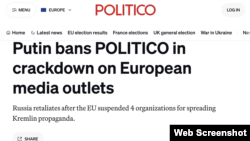Russia said on Tuesday it was banning access inside Russia to the broadcasts of 81 different media outlets from the European Union — including Agence France-Presse and Politico — in retaliation for a similar EU ban on several Russian media outlets.
The European Union said in May it was suspending the distribution of what it described as four "Kremlin-linked propaganda networks," stripping them of their broadcasting rights in the bloc.
It said at the time that the ban applied to Voice of Europe, to the RIA news agency, and to the Izvestia and Rossiyskaya Gazeta newspapers.
The Russian Foreign Ministry hit back on Tuesday, releasing a list of 81 media outlets from 25 EU member states, as well as pan-European outlets, whose broadcasts it said would no longer be available on Russian territory.
It accused the outlets of "systematically distributing inaccurate information" about what Russia calls its special military operation in Ukraine.
France's Agence France-Presse (AFP) news agency, Austria's ORF state TV company, Ireland's RTE broadcaster, digital outlet Politico and Spain's EFE news agency were among the outlets affected by the move, along with many other national broadcasters and newspapers.
"The Russian Federation has repeatedly warned at various levels that politically motivated harassment of domestic journalists and unjustified bans on Russian media in the EU will not go unanswered," the Foreign Ministry said in a statement.
"In spite of this, Brussels and the capitals of the bloc's countries preferred to follow the path of escalation, forcing Moscow to adopt mirror and proportional countermeasures."
It said it would review its ban if the EU lifted its restrictions on RIA, Izvestia and the Rossiyskaya Gazeta newspaper, all of which it described as Russian media outlets.
Vyacheslav Volodin, the speaker of the State Duma lower house of parliament, said in May that the EU move had shown that the West refused to accept any alternative point of view and was destroying freedom of speech.
'Unjustified measure'
Italy's Foreign Ministry on Tuesday condemned the Russian decision to ban access to outlets including Italian broadcasters Rai and La7 and newspapers La Repubblica and La Stampa.
"We regret the unjustified measure taken against these Italian broadcasters and newspapers, which have always provided objective and unbiased information on the conflict in Ukraine," the ministry said.
AFP declined to comment, and RTE did not immediately reply to a request for comment on the measures, announced a day before the Russian trial of U.S. journalist Evan Gershkovich on espionage charges is due to begin.
Jamil Anderlini, Politico's editor-in-chief for Europe, described the measures as "completely unacceptable" and said in a statement that it was "not the first time press freedoms have been restricted through politically motivated attacks."
"We call for the immediate lifting of these restrictions and continue to call for Evan's immediate release," he wrote.
The first American journalist to be detained on spy charges in Russia since the Cold War more than three decades ago, Gershkovich, a reporter for The Wall Street Journal, has denied he is a Central Intelligence Agency spy. The Journal says Gershkovich was doing his job and denies he is a spy.
Many Western news organizations pulled staff out of Russia after it launched its full-scale invasion of Ukraine in February 2022 and passed laws soon afterwards that set long prison sentences for "discrediting" the armed forces.
Russian officials say large parts of the Western media spread false, unbalanced stories about Russia, and that Western media organizations are waging an information war.





